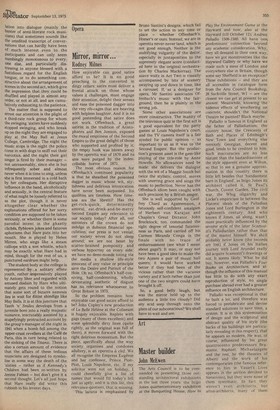Opera
Mirror, mirror...
Rodney Mums
How enjoyable can good satire afford to be? It is no good preaching to the converted in dingy cellars: satire must deliver a frontal attack on those whose values it challenges, must engage their attention, delight their senses and ease the poisoned dagger into the very rib-cages that are heaving with helpless laughter. And it is no good pretending that satire does not work. Offenbach, a great satirist in the tradition of Aristophanes and Ben Jonson, exposed the moral emptiness of the Second Empire to the great delight of those who supported and profited by it: the empty husk was blown away by the operetta war of 1870 and its sins were purged by the indescribable horror of 1871.
The most obvious reason for Offenbach's continued popularity is that he sheathed the poisoned dagger in music whose wit, stylishness and delirious intoxication have never been surpassed. Its qualities are timeless. How timeless are the libretti? Has the get-rich-quick, determinedly amoral, eat-drink-and-be-merry Second Empire any relevance to our society today? After all, our ministers of the crown do not indulge in dubious financial speculation; our press is not venial; our society wives do not sleep around; we are not beset by scatter-brained pomposity and verbose hypocrisy on every side; we have no demi-monde toting via the media a shallow life-style innocent of any value or principle save the Desire and Pursuit of the Hole. Oh no, Offenbach's half-conniving, half-condemning, wholly devastating aesthetic of disgust has no, relevance whatsoever to Great Britain in 1975.
So the problem remains: how enjoyable can good satire afford to be? John Copley's new production of La Belle Helene at the Coliseum is hugely enjoyable. Replete with gags (many of them excellent) and some splendidly dirty lines (quite rightly, as the original was full of them), it moves forward with the right delirious momentum. But the piece, specifically about the way society organises and condones adultery, is an operetta et clef. We all recognise the Empress Eugenie and her confessor, Prince PlonPlon, Louis Napoleon, etc. If my solicitor were not on holiday, I could cheerfully give a list of names that would fill today's bill just as aptly, and it is this list, this relevance-quotient, that is missing.
This lacuna is emphasised by Bruno Santini's designs, which fail to set the action in any time or place — whether Offenbach's, Homer's or ours. Instead, we are in operetta never-never land, which is not good enough. Neither is the stultifying vulgarity of the decor, especially in juxtaposition to the supremely elegant score (conducted here in the original orchestration by Charles Mackerras). The suave waltz in Act Two is visually accompanied by bits of scenery swaying up and down in time, like a carousel. If, as a designer for opera, Mr Santini associates Offenbach's music with the fairground, then he is plainly in the wrong job.
Some other associations are more constructive. The inanity of the television quiz in the first act is a good equivalent for the party games at Louis Napoleon's court, and the TV camera itself is a fair symbol for public opinion — as important to us as it was to the Second Empire. But the production's greatest asset is the gem-like playing of the title-role by Anne Howells. No allowances need be made: she delivers the dialogue with the wit of a Maggie Smith but twice the stylistic control, moves with unerring grace and sings the music to perfection. Never has the Offenbach idiom been caught with such precision by a British singer.
She is well supported by Geoffrey Chard as Agamemnon, a fatuously self-confident amalgam of Herbert von Karaj an and Chaplin's Great Dictator. John Brecknock, too, commanded the right degree of tenorial fatuousness as Paris, and carried off his Carmen Miranda Conga in the finale with no trace of embarrassment (see what I mean about gags?). It may, or may not have been a good idea to make the two Ajaxes a pair of music hall queers; it would have worked better if they had been of the vicious rather than the vacuous variety and if both rather than just one of the two singers could have brought it off.
So, a good belly laugh, but was the mirror held up to the audience a little too cloudy? Did any acid seep through onto the plate of our subconscious? We shall have to wait and see.


































 Previous page
Previous page